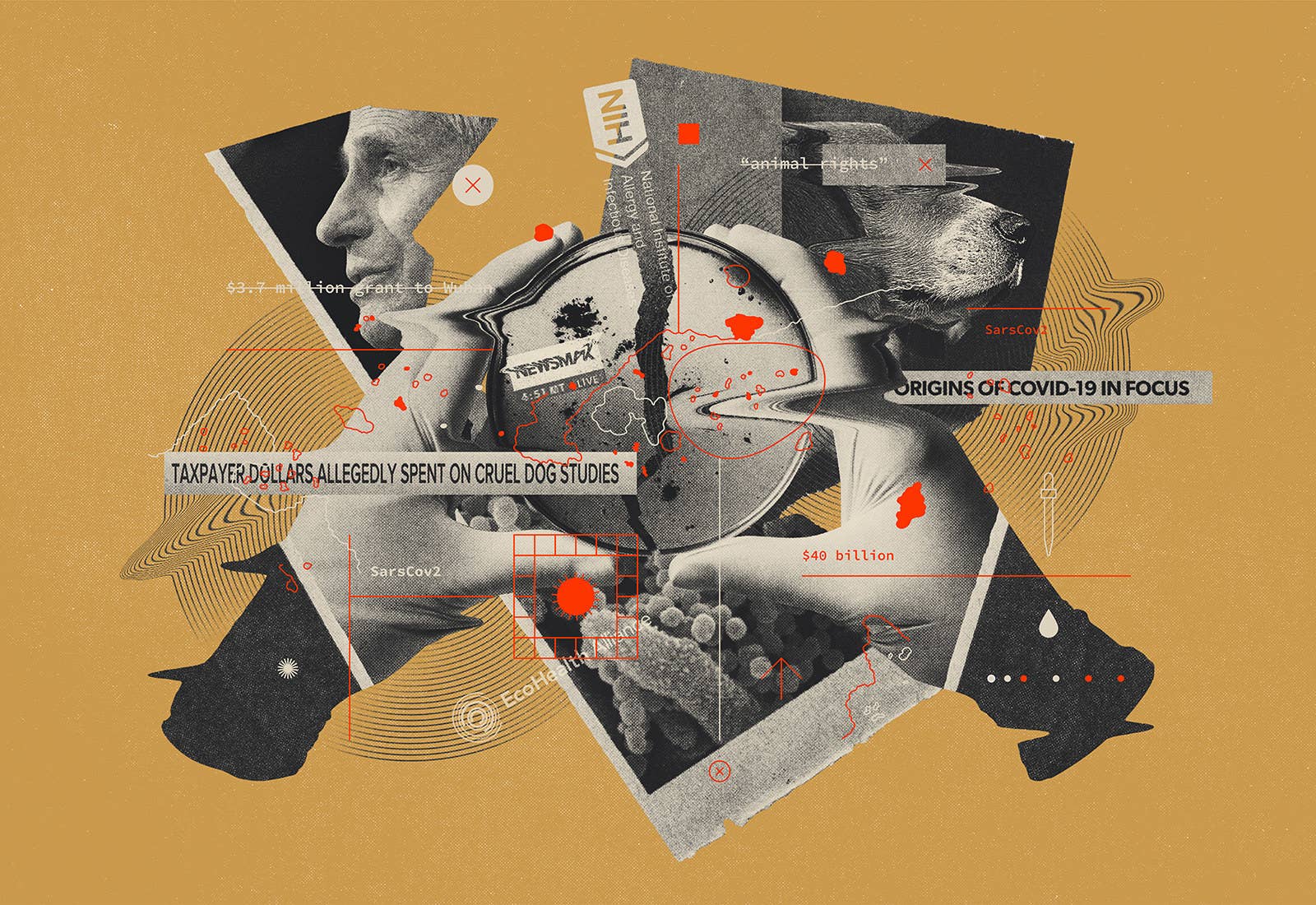
As much of the United States entered COVID lockdowns in April 2020, a tiny group that campaigns against federal funding for animal experiments spotted an opportunity.
Speculation was swirling in right-leaning media that the virus behind the pandemic had emerged from a lab in Wuhan, China, rather than from wildlife sold for food in the city’s markets. As it happened, the White Coat Waste Project had been looking into taxpayer money going to labs in China, including in Wuhan. The group’s founder had strong contacts with Republican politicians and had launched the group with the mission of getting conservatives into animal activism.
The White Coat Waste Project sprung into action, persuading DailyMail.com to run a story saying the US government had funded the lab. Then all hell broke loose.
Then-president Donald Trump, keen to blame China for the pandemic, was soon involved. After prodding from the conservative outlet Newsmax at a press conference, his administration terminated the grant from the National Institutes of Health, which had been awarded to a New York–based nonprofit called the EcoHealth Alliance.
Since then, the controversy over whether the COVID pandemic started with a “lab leak” has escalated into a ferocious fight, with conflicting narratives that paint EcoHealth and the Wuhan Institute of Virology either as out-of-control scientists who may have caused the pandemic through inherently risky research or as the victims of politically motivated conspiracy theories, unfairly vilified as the architects of a catastrophe that they worked for years to prevent by studying the risks posed by bat coronaviruses.
Two years on, and with the scientific trail going cold, it’s possible that the mystery of the origins of SARS-CoV-2, the virus that causes COVID-19, may never be conclusively solved. But thousands of pages of NIH emails and other documents released to BuzzFeed News through a Freedom of Information Act lawsuit show how the White Coat Waste Project rode the wave of partisan pandemic politics to serve its cause, and in the process triggered a storm that engulfed EcoHealth, one of the world’s largest groups studying potentially dangerous animal viruses. They also show how the NIH, a behemoth that spends more than $40 billion annually on biomedical research, stumbled under the political pressure the White Coat Waste Project brought to bear.
The White Coat Waste Project has subsequently channeled right-wing anger toward Anthony Fauci, the public face of COVID policies including mask and vaccine mandates, accusing his National Institute of Allergy and Infectious Diseases, which is part of the NIH, of funding “beagle torture.” The White Coat Waste Project is writing a controversial new activist playbook — and it’s unclear whether anyone can control the forces that it has helped to unleash.
“They jumped on the bandwagon of how I have become public enemy number one of the far right,” Fauci told BuzzFeed News. “If you engage and try and push back on that, it very often only gives it legs. And then it becomes even worse of a problem.”
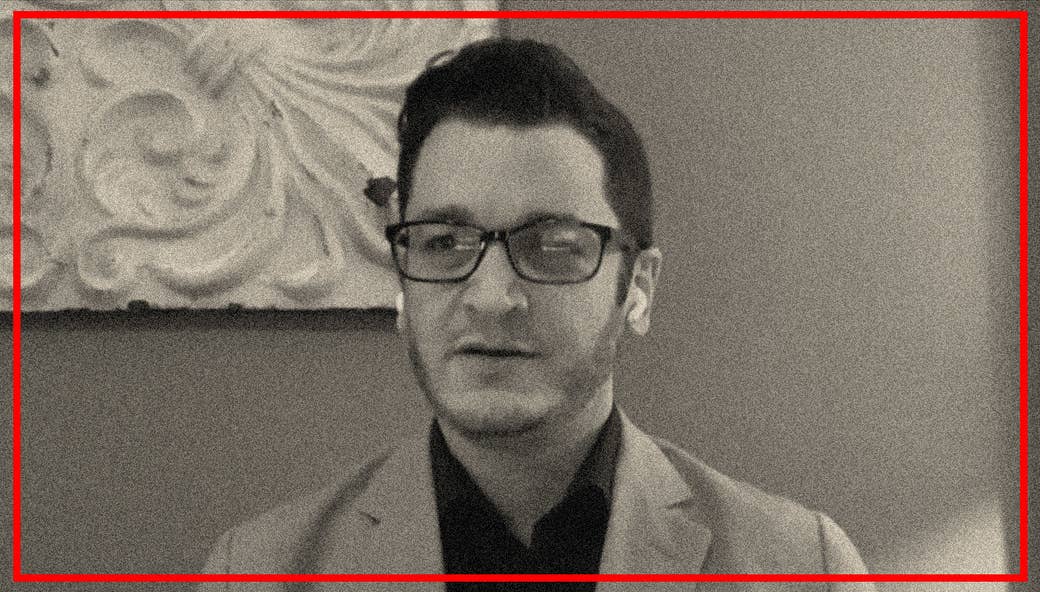
The White Coat Waste Project was formed in 2013 by Anthony Bellotti, a campaign consultant who over the years had worked for Republican candidates including Arnold Schwarzenegger and Lisa Murkowski, and on efforts to defund Planned Parenthood and Obamacare. But Bellotti’s real passion had long been animal protection, he told BuzzFeed News — an interest forged at the age of 17 when he worked as a summer intern in a lab doing research on pigs, studying ways to extend the time they could be kept under anesthesia during heart surgery. Bellotti said he was struck both by the animals’ suffering and the “repugnant and callous attitude” of the experimenters. “It really made a mark on me,” he said.
Poring over polling data, Bellotti could see that there was a big gap between Democrats and Republicans on the issue. Democrats were much more likely to support campaigns against animal experiments, which had often focused on corporate labs, and Republicans tended to back the research. So Bellotti crafted a message calculated to bring the missing Republicans on board, focusing on government spending. He avoids the label “animal rights,” and has cast the White Coat Waste Project as a “taxpayer watchdog uniting liberty-lovers and animal-lovers.”
In addition to mobilizing support from the political right, there was another reason to target government spending: Congress has the power to shut it down. “The goal isn’t to change hearts and minds, it’s to win the fight,” Bellotti told BuzzFeed News. “We had to get to the root cause of the problem, which was the government spending.”
The group didn’t really take off until 2016, when Bellotti hired Justin Goodman, a former director of laboratory investigations with People for the Ethical Treatment of Animals, to head the White Coat Waste Project’s advocacy efforts. Goodman started digging into government databases and filing FOIA requests to identify projects that the group could campaign to defund.
Even before the pandemic, the White Coat Waste Project scored some victories. An early campaign, launched in a report called “Spending to Death,” highlighted experiments involving dogs in federal labs, including one studying the effects of blood transfusions in dogs with pneumonia in which some of the animals died. The group then turned up the heat on the Department of Veterans Affairs Medical Center in Richmond, Virginia, focusing on experiments into heart disease in which dogs were run on treadmills after their heart rhythms were disrupted using implanted pacemaker devices. The White Coast Waste Project’s multiyear effort to shut down Veterans Affairs dog research eventually led Congress to restrict spending on the work and demand explicit approval from the secretary for veterans affairs for new dog experiments by the agency.
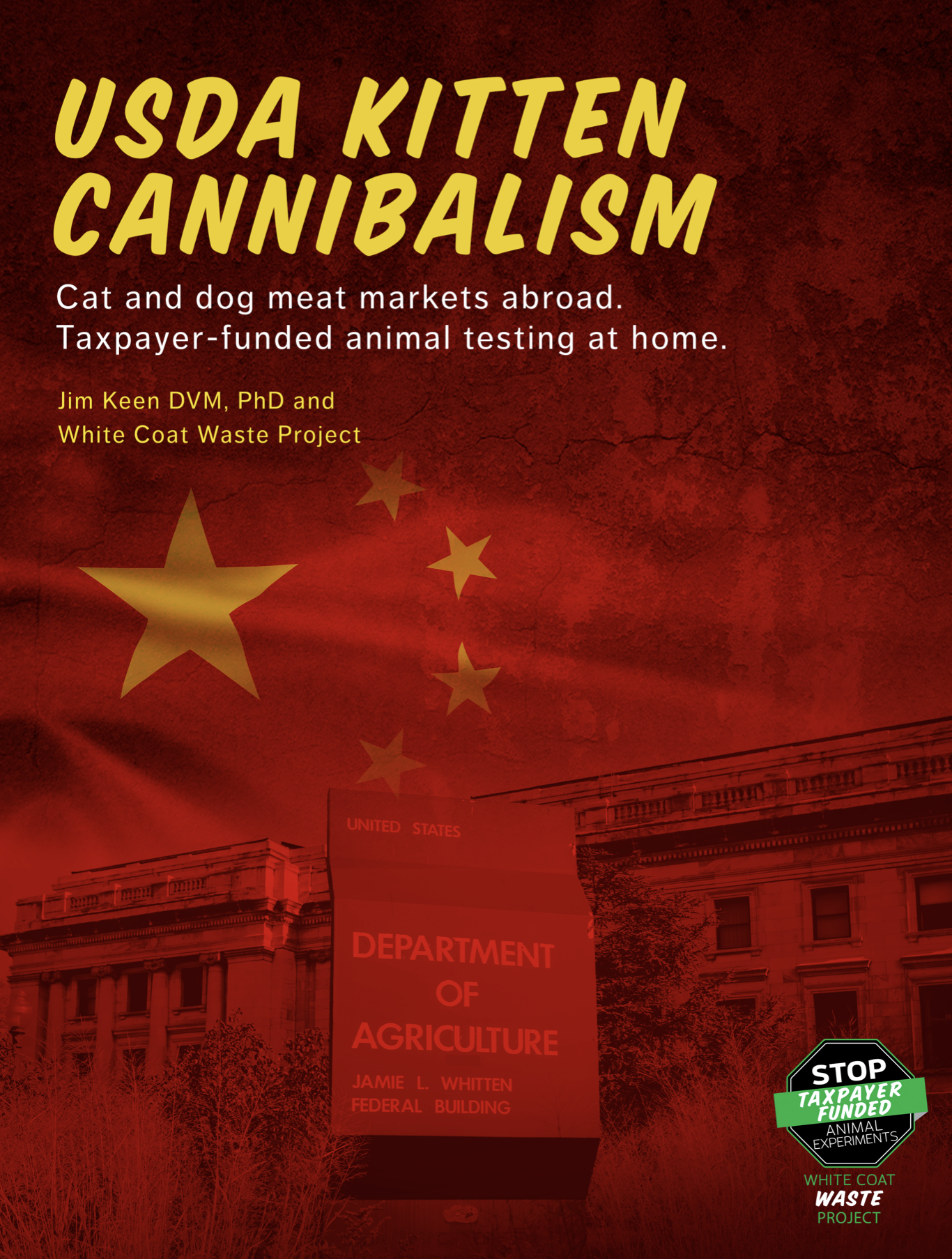
But it was another campaign that sowed the seeds for the attack on EcoHealth and its collaboration with the Wuhan Institute of Virology. In 2018, the White Coat Waste Project began to target the US Department of Agriculture’s Animal Parasitic Diseases Laboratory in Beltsville, Maryland, zeroing in on its research into toxoplasmosis, which can infect people exposed to cat feces and can cause brain or eye damage in those with compromised immune systems. The campaign culminated in a March 2019 White Coat Waste Project report called “USDA Kitten Cannibalism.” Its cover featured the Chinese flag superimposed over a photo of USDA’s headquarters in Washington, DC.
That framing drew on an experiment published in 2007 in which cats at the Maryland facility were fed meat from other cats purchased at a market in China to gauge its infectivity. Although the full report noted that these experiments were no longer being run, the association between this gruesome-sounding research and a nation seen as a major adversary to the US resonated with members of Congress from both parties and with the media. Within a couple of weeks, the USDA announced that the cat toxoplasmosis research would be shut down, stating that it had “reached its maturity.”
After that win, Bellotti said that the White Coat Waste Project started to wonder about what else was being funded with taxpayer dollars outside of the US: “This is horrible stuff. What else is going on?” So Goodman started to look at research in foreign labs funded by the NIH, turning to a list of those given an “animal welfare assurance” needed to receive federal dollars for animal experiments. He focused particularly on labs in the US’s two main geopolitical rivals. “One of the things that struck us was that there were at the time 31 labs in Russia and China,” Goodman told BuzzFeed News.
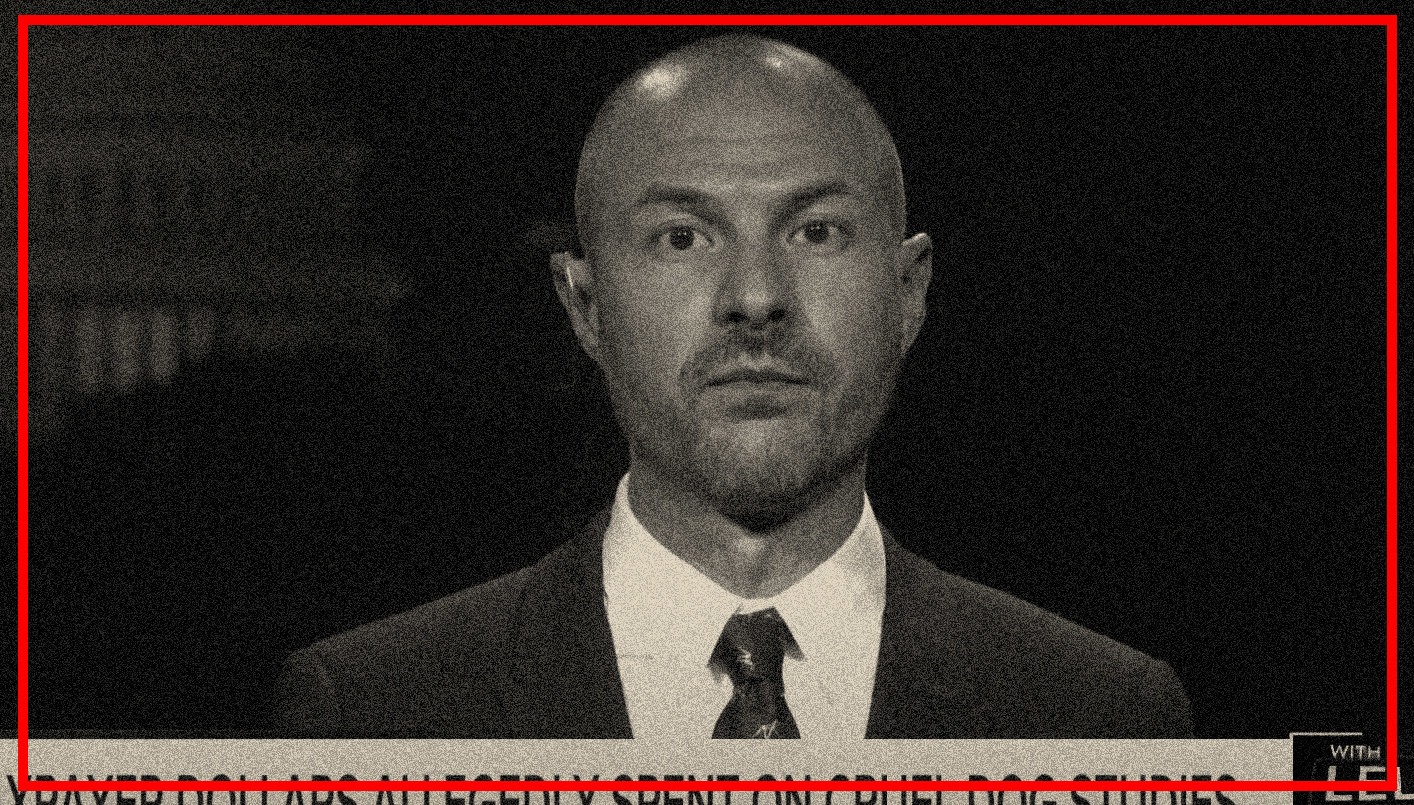
Still, the White Coat Waste Project remained a small player in the world of animal activism: Its total revenue in 2019 of around $1.4 million was dwarfed by the $60 million pulled in by Goodman’s former employer PETA. And initial efforts to interest the Trump administration in Goodman’s findings on the NIH’s overseas animal research didn’t gain much traction. In January 2020, as reports emerged of a dangerous new virus spreading in China, the White Coat Waste Project had a meeting with White House officials. Goodman recalls specifically mentioning the Wuhan Institute of Virology, but the Trump staffers didn’t bite. “We gave them a bunch of information and never heard back,” Goodman said. “We got a cursory ‘thank you.’”
At that time, Peter Daszak, president of the EcoHealth Alliance, had never heard of the White Coat Waste Project and had no inkling of the storm that was brewing. “If you would have told me that this chain of events was going to happen, I would have said, ‘No way, this is absolutely impossible,’” he told BuzzFeed News.
Federal spending records show that EcoHealth has received almost $120 million from research grants and contracts since 2008, from agencies including USAID, the NIH, and the Defense Threat Reduction Agency. EcoHealth’s emergence as a major player in assessing pandemic threats, working with labs across the world, was fueled in part by the “near miss” with SARS, another respiratory disease caused by a coronavirus that emerged in southern China in 2002 and killed nearly 800 people before its spread was brought under control.
Indeed, in late January 2020, officials in Fauci’s institute who were preparing talking points for their boss, due to appear at a Jan. 28 press conference on the US response to the new coronavirus, described Daszak’s research into the risks posed by bat coronaviruses in glowing terms. The EcoHealth group was “among the biggest players in coronavirus research,” wrote David Morens, senior adviser to Fauci, in an email obtained through the BuzzFeed News FOIA lawsuit. “In short, we have on our team … probably the world’s experts in these non-human coronaviruses.”
“If you would have told me that this chain of events was going to happen, I would have said, ‘No way, this is absolutely impossible.’”
Fast-forward to April 2020, and the White Coat Waste Project’s findings about NIH funding for the Wuhan Institute of Virology were starting to find a receptive audience. On April 11, the group succeeded in getting DailyMail.com, the website of a British tabloid newspaper with a large online readership in the US, to run the story: “REVEALED: U.S. Government Gave $3.7 Million Grant to Wuhan Lab at Center of Coronavirus Leak Scrutiny.” ($3.7 million was actually the total sum paid over six years to EcoHealth, gleaned by Goodman from the NIH’s grants database; in fact, less than $600,000 went to the Wuhan institute.)
The White Coat Waste Project started reaching out to Republicans in Congress — and the NIH was soon reeling. By April 13, NIH officials were scrambling to respond to a request for information from the office of Florida Sen. Marco Rubio, which had forwarded an email from Goodman noting the press coverage of the White Coat Waste Project’s “troubling find” about the Wuhan institute. In that email, Goodman noted: “We’re working with Rep. Matt Gaetz (R-FL) and others on a sign-on letter about this.”
Two days later, the alarm bells were ringing at the very top of the NIH. Lawrence Tabak, deputy to Francis Collins, then director of the NIH, wrote to his boss and Fauci, whose institute had awarded the grant, emphasizing in bold that the Trump White House was on the warpath: “The WH has strongly embraced concerns raised by Congressman Gaetz who is publicly criticizing HHS/NIH for funding the Wuhan laboratory’s bat research.”
“I reached Tony, he is now informed,” Collins replied, confirming Fauci was in the loop.
Then, on April 17, a Newsmax reporter asked Trump about the project, repeating the false claim that $3.7 million had gone to the Wuhan institute. “We will end that grant very quickly,” Trump said.
Michael Lauer, head of the NIH Office of Extramural Research, part of Collins’ central command, then took control. On April 19, Lauer wrote to inform EcoHealth that NIH was looking to suspend the Wuhan institute from receiving federal funds. Other spending could continue, but EcoHealth should send no more money to China. In an April 21 email, Daszak told Lauer that since the grant was renewed for a second five-year term in July 2019, no funds had gone to Wuhan “nor has any contract been signed.”
But three days later, NIH terminated the entire grant, for “convenience.” In a one-page letter to EcoHealth on April 24, Lauer wrote: “At this time, NIH does not believe that the current project outcomes align with the program goals and agency priorities.”
Daszak was stunned. So too were many other scientists, disturbed that research that had been exceptionally highly rated in peer review, and which was directly related to the pandemic, could be canceled at a stroke. On May 21, 77 US Nobel Prize winners in science wrote to NIH director Collins and Alex Azar, secretary of health and human services, protesting the decision and describing the explanation given by Lauer about the NIH’s priorities as “preposterous under the circumstances.”
EcoHealth’s response came on the day after the Nobelists’ letter, when the group’s pro bono lawyer wrote to Lauer contending that the NIH didn’t have the legal authority to terminate a research grant in this way, without cause. The letter also argued that EcoHealth’s goals were virtually identical to those laid out in the NIAID Strategic Plan for COVID-19 Research, released the day before the grant termination. (The letter was previously published by the Intercept, which has its own FOIA lawsuit and has run a series of stories based on the material it has obtained.)
Later, in a congressional hearing, Fauci was asked why the grant was terminated. “It was canceled because the NIH was told to cancel it,” he told the House Energy and Commerce Committee on June 23, 2020. “We got it from the highest office of the president: ‘Cancel that grant,’” Fauci confirmed to BuzzFeed News.
The backlash against Lauer’s initial letter seemed to prompt a rethink from the NIH. As first reported by the Wall Street Journal, Lauer came back to EcoHealth with a second letter on July 8. Abandoning the explanation about the NIH’s priorities, Lauer wrote that the grant was reinstated, but immediately suspended because of concerns about biosafety at the Wuhan Institute of Virology. That tied the suspension directly to the lab leak theory, which posits that the pandemic may have started with the accidental release of a virus being studied in the lab, perhaps through a worker who became infected.
“We have concerns that WIV has not satisfied safety requirements under the award, and that EcoHealth Alliance has not satisfied its obligations to monitor the activities of its subrecipient to ensure compliance,” Lauer wrote.
To lift that suspension, EcoHealth would have to respond to seven requests for information and materials. They included: “EcoHealth Alliance must arrange for WIV to submit to an outside inspection team charged to review the lab facilities and lab records, with specific attention to addressing the question of whether WIV staff had SARS-CoV-2 in their possession prior to December 2019.” There was no way a US nonprofit could get the Chinese authorities to agree to such a request: Even the WHO team, including Daszak, that later visited the institute in February 2021 as part of its study of the origins of COVID-19 didn’t get this unfettered access.
With Lauer’s second letter, the grant entered a state of limbo from which it has yet to emerge — and seems unlikely to.

Since then, Republicans in Congress have leaned hard into the lab leak theory and the related idea that the NIH funded EcoHealth and the Wuhan institute to conduct “gain-of-function” research — when scientists deliberately make viruses more dangerous in order to study pandemic risks. Internal correspondence obtained by BuzzFeed News shows NIH officials discussing at length how to respond to demands for information from congressional Republicans about the agency’s funding for EcoHealth and the Wuhan institute.
The White Coat Waste Project once again entered the fray. In November 2021, it released 378 pages of documents obtained through FOIA, including a back-and-forth in 2016 between Daszak and two NIAID officials. Those officials were concerned that some experiments under EcoHealth’s collaboration with the Wuhan institute might breach a pause the US government had imposed on gain-of-function work that could create a potentially pandemic virus. The experiments involved creating “chimeric” coronaviruses, engineered to combine genetic sequences from different viruses sampled from the wild.
Some proposed experiments involved chimeras based on the virus that causes MERS, a respiratory disease that first showed up in Saudi Arabia in 2012 and has since killed almost 900 people. EcoHealth wanted to replace the MERS virus’s “spike” protein, used to enter animal or human cells, with those from these new viruses, to see whether they were also able to latch onto a molecule on cell surfaces targeted by the MERS virus. The NIAID officials also wanted to know more about two chimeras that had already been made, in which the genes for spike proteins from newly discovered bat coronaviruses had been put into another bat coronavirus called WIV1, named after the Wuhan Institute of Virology.
The NIAID officials accepted Daszak’s explanation that these experiments didn’t meet the US government’s definition of gain-of-function research: He had argued that there was no reason to suppose the chimeric viruses would be any more dangerous than the viruses behind MERS and SARS. So the NIAID allowed the research to continue.
Daszak responded: “This is terrific! We are very happy to hear that our Gain of Function research funding pause has been lifted.” The White Coat Waste Project later claimed that it had caught Daszak “red-handed, admitting to gain-of-function research” — omitting the context that this quote was part of an exchange in which he had argued that the research didn’t meet the US government’s definition of that term.
“We’ll have to agree to disagree here,” Goodman said, when BuzzFeed News questioned this claim. “We’re not interested in debating the interpretation of these emails or the definition of gain-of-function. We’re only interested in exposing and ending wasteful government spending on dangerous animal experiments.”
Emails and other documents obtained by BuzzFeed News show that the chimera experiments had already been deepening EcoHealth’s problems, as Lauer and other NIH officials looked for evidence that EcoHealth had breached the terms and conditions of its grant.
“Because [Fauci] became a household name as the pandemic progressed, sure, it created an opportunity to go after him for animal testing in a way that would really make waves.”
A heavily redacted series of emails from May 2021 centers on the July 2016 letter from the NIAID that had given EcoHealth permission to resume the chimera work. Accepting a suggestion made by Daszak himself, it stated that if any of the chimeric viruses showed unexpectedly rapid growth, he would “immediately stop all experiments with these viruses” and provide NIAID officials with information about the unexpected outcomes. Shortly after receiving the letter, Lauer sent it on to a senior attorney with the Department of Health and Human Services, assigned to the NIH, changing the subject line on the email thread to “Gift.”
Daszak’s problem was that the NIH determined that an experiment described in annual progress reports for the grant indicated that one of these viruses had made mice engineered to carry the human receptor targeted by SARS-like viruses sicker than expected and showed signs of rapid growth. “EcoHealth failed to report this finding right away,” NIH deputy director Tabak later wrote in an October 2021 letter to James Comer, the ranking Republican member on the House of Representatives Committee on Oversight and Reform.
None of this amounts to a smoking gun linking EcoHealth and the Wuhan institute to the origins of COVID, as the viruses involved were very different to SARS-CoV-2. And in a letter to Lauer and Tabak after the latter’s communication with Comer, Daszak contested the conclusion that the experiment did show rapid viral growth and argued that EcoHealth had complied with its reporting requirements.
But it gave Lauer evidence that he was looking for. EcoHealth is now under audit from the Office of Inspector General for the Department of Health and Human Services, an independent watchdog that monitors fraud, waste, and other problems, as part of a review of the NIH and “selected grantees” initiated on June 11, 2021. Documents received by BuzzFeed News through its FOIA lawsuit, including a timeline of events put together by Lauer dated June 13, 2021, indicate that the suggestion for an OIG audit of EcoHealth came from the NIH, just days after Lauer sent his “Gift” email.
The NIH declined to discuss Lauer’s email and timeline, saying in a statement: “NIH doesn’t comment on internal deliberation of grant awards.”
In December 2021, the White Coat Waste Project claimed a win from its activism around the EcoHealth grant when President Joe Biden signed the 2022 National Defense Authorization Act into law. It contained specific wording blocking the Department of Defense — which over the years has provided almost $40 million to EcoHealth — from supporting the nonprofit’s research in China.
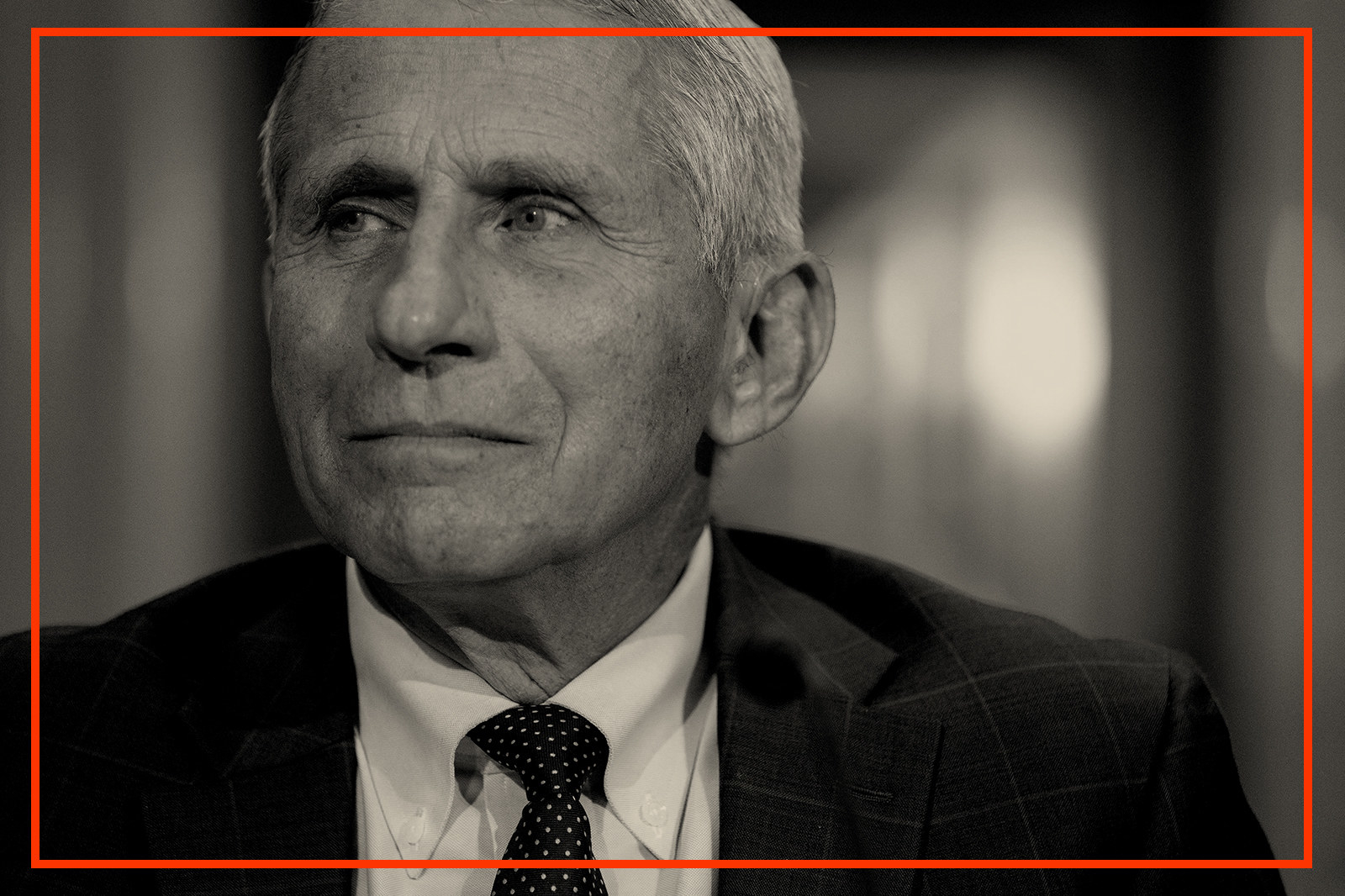
The gain-of-function fight had also intensified the pressure on Fauci, who was by now a hate figure for many on the political right. In November 2021, he and Kentucky Republican Sen. Rand Paul clashed angrily in a Senate hearing, as Paul accused Fauci of changing the definition of gain-of-function and funding dangerous research in Wuhan. “He is egregiously incorrect,” Fauci responded. In January, they locked horns in another hearing, featuring an extraordinary exchange in which Fauci accused Paul of jeopardizing his personal safety for political gain.
“What happens when he gets out and accuses me of things that are completely untrue is that all of a sudden that kindles the crazies out there, and I have threats upon my life, harassment of my family and my children,” Fauci said.
By the time of these acrimonious exchanges, the White Coat Waste Project had embarked on another campaign that made Fauci its main focus. In July 2021, the White Coat Waste Project launched its “BeagleGate” campaign, highlighting research on dogs funded by the NIAID, with a blog post headlined: “WCW Exposé: Fauci Spent $424K on Beagle Experiments, Dogs Bitten to Death by Flies.”
The next month, the White Coat Waste Project accused Fauci of funding “beagle torture” in Tunisia, referring to a paper published in July 2021 investigating whether the biting sand flies that spread visceral leishmaniasis, a potentially fatal disease, preferred to feed on dogs already infected with the parasites that cause the condition.
The story really took off on Oct. 24, 2021, when 24 members of Congress from both parties, led by Rep. Nancy Mace, a Republican from South Carolina, wrote to Fauci protesting “costly, cruel, and unnecessary taxpayer-funded experiments on dogs.” Fauci’s nemesis, Rand Paul, wasn’t among the signatories, but weighed in with a tweet touting the White Coat Waste Project’s original blog post:
Dr. Fauci’s division at the National Institutes of Health @NIH wasted over $424,000 on deadly and unnecessary experiments on beagles. Thank you @WhiteCoatWaste for the expose! #BeagleGate #PaulsPups https://t.co/o9MMBI3H7U
The Washington Post later reported that Fauci’s office received 3,600 calls in 36 hours, causing his assistant to stop answering the phone for two weeks. The newspaper linked the onslaught to “a campaign by a little-known animal rights group called the White Coat Waste Project.”
The NIAID tried to address the controversy, stating that it didn’t actually fund the Tunisian beagle research paper — which in November 2021 was corrected to remove reference to a grant from the institute, which had been awarded to a researcher at Ohio State University for related work. “NIAID was listed as a courtesy because it had supported other leishmaniasis research in the past,” a spokesperson for the university told BuzzFeed News. But that correction seemed only to give the White Coat Waste Project more ammunition. “Once again…color us unconvinced,” it wrote in a later blog post disputing the NIAID’s denial of funding the work.
The White Coat Waste Project’s critics argue that its demonization of Fauci, seemingly calculated to channel existing right-wing anger with the government scientist seen as the public face of mask and COVID vaccine mandates, has taken animal activism into scary territory.
“They take a tiny sliver of truth, and then around that they build this highly emotional somewhat fictional narrative to build their case,” Jim Newman, director of strategic communications with Americans for Medical Progress, which argues that animal experiments are essential to develop new treatments and vaccines, told BuzzFeed News. Animal activists have long been accused of cherry-picking facts and ignoring the goals of research to present animal experiments in the worst possible light. But portraying individuals as cruel villains in the current febrile political climate is “a very dangerous direction to be headed,” Newman said.
“Of course, the pro-animal experimentation lobby hates that we hold government bosses accountable for funneling tax dollars to cruel and wasteful animal tests,” Goodman said. “We generally don’t run campaigns targeting individual taxpayer-funded animal experimenters to respect their privacy and because we question the approach’s effectiveness, but federal agency bosses are public figures and fair game.”
Threats to Fauci’s life, which began well before the White Coat Waste Project’s BeagleGate campaign, have been widely documented. Daszak, too, has faced security scares, including an incident in August 2020 when an envelope containing a mysterious white powder reportedly turned up at his home. “I get death threats regularly and we get crank calls at home trying to keep us awake at night,” Daszak told BuzzFeed News.
The White Coat Waste Project stresses that it opposes violence and issued a statement in October 2021 saying it had no quarrel with Fauci over his advice on COVID policies. “You could stand shoulder-to-shoulder with him on COVID response and go toe-to-toe with him on other issues,” said Goodman, who makes no apology for the group’s decision to make Fauci the focus of the BeagleGate campaign. “Because he became a household name as the pandemic progressed, sure, it created an opportunity to go after him for animal testing in a way that would really make waves.”
As the White Coat Waste Project has seized its opportunities and gained a higher public profile, the group has itself come under scrutiny. In February, the Campaign for Accountability filed a complaint with the IRS and the Federal Election Commission, alleging that the White Coat Waste Project had coordinated with the White Coat Waste Political Action Committee, founded in 2017, in breach of regulations prohibiting tax-exempt nonprofits from engaging in political campaign activities.
In an interview with BuzzFeed News, Bellotti declined to answer questions about the political action committee, which he said was a separate organization. Goodman later sent a statement describing the Campaign for Accountability’s complaint as a “politically-motivated, baseless, and frivolous attack,” noting: “The WCW Project does not fund activities of the distinct, all-volunteer WCW PAC.”
Despite the partisan dynamics that have driven the White Coat Waste Project’s campaign against funding for the Wuhan Institute of Virology, Bellotti told BuzzFeed News that his group’s goal remains finding ways to unite Democrats and Republicans on defunding animal experiments backed by the US government. “We didn’t know when we launched this that it would get partisan in the way it did,” he said.
The White Coat Waste Project’s latest campaign, again tapping into concern about US taxpayer dollars going to the nation’s most powerful adversaries, might just have broader political appeal. Less than a week after Russia’s invasion of Ukraine, it published a new blog post: “Breaking: WCW Discovers NIH Pays For Cruel Kitten Experiments…in Russia!” ●
UPDATE
This story has been updated to note a related FOIA lawsuit from the Intercept.
